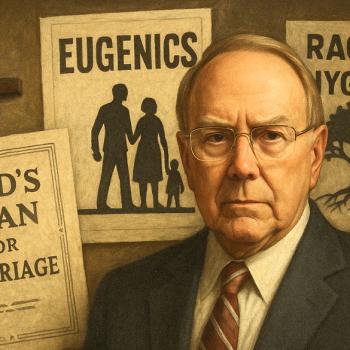You talk in the book about having remained an atheist, even during years of great interest -- even expertise -- in religion and theology.
Yes, deep down, no matter how much I appreciated and understood religion -- because it was damned interesting, and it was philosophically honorable. I defended Judaism, I defended Christianity. I gave lectures on it. I wrote books and I could explain it. But down deep I still didn't believe that this idea of God corresponded to something out there, really. Or in here -- either way.
My mind believed it. But somewhere down deep I didn't really. It was only when I actually touched a certain level of inner experience, and I said, Ah, that's it. Now I am absolutely certain that there is such a thing. I always believed, as I was studying these things, that there was something higher in the universe. I never thought it was a dead, mechanical universe, like scientism. It was only when I experienced it as part of me that I saw that it was true.
You refer to the idea of the human being as microcosm, or miniature universe, and how self-knowledge can open onto a more universal understanding. But how about the social? What happens when human beings come together?
The best and the worst of humanity comes in groups. Think of the difference between a mob and a community. A mob is low level -- with no insult intended to animals -- but it's a bestial mass, a herd obeying the coarsest violent emotions, self-suggestions, or fantasies. Anger and the mob have caused untold horrors throughout humanity's history: the mass mind, the herd instinct. When people come together they sometimes exaggerate the worst qualities of human beings.
But without a community, without help, without interrelationship, I don't think most human beings can ever come to true spiritual development. You need a community of some kind or other. Very rarely, if ever, without the help of environment or community or culture, does someone appear who becomes a highly evolved person, in my opinion. What kind of community would be the question, and how difficult that is.
People can relate to each other in such a way that it calls down something, and I've experienced that. When two or three people seriously listen to each other, speak and exchange with each other, something appears: "Where two or three come together in my name," is, I think, a fact. It's in the possible existence of such community that I think the hope of the world lies. I don't think the world can make it without developed human beings, and a community supporting inner development.
Meanwhile we've got a public culture that seems particularly contentious -- debate as blood sport.
People are attached to their opinions. Put simply, that means their fears and anxieties, their agitation, have been fueled or absorbed by an idea or concept or thought. It's hard to get to the root, because the root of this is the fundamental sleep of mankind -- or corruption, or sin, or ignorance, whatever word you want to use.
And people cannot listen to each other. When we're talking, you and I, mostly when I'm talking and trying to listen to someone I maybe hear -- if I'm lucky -- one-third of what they say. Mostly I hear my own thoughts, and when I try to write down what they've said I mix it with my own thoughts.
But there is a discipline that one can obtain. It's not that hard. It's to step back from one's own opinions, make a space in myself and let you in. I don't have to agree with you but I have to let you in, so that you are heard. I hear you. And you let me in. And that way something very beautiful can appear; I can still disagree completely with you, but I don't deny your humanity.
The art of listening is the first step of every ethics. That's been misunderstood: as if to become good is to become ethical. But it's not a question of acting and doing the right thing -- that's hard. But we can listen to the other, give our attention, which is our precious human substance, to the other person. When I give my attention to you it's a little bit of love, whatever you might call it: and that's the source of ethics. That's been lost entirely. And it's really practical, it can happen. But people can't do it. They don't do it. They don't know they have this capacity. They think listening is simply waiting for you to pause so I can come in.
Speaking of listening, you use stories from your teaching experience to such great effect. It sounds as if teaching for you has been a laboratory...
Absolutely. That is exactly the word I would use.
And you teach courses in religion, spirituality, so you encounter every kind of opinion. I was so interested in that encounter you describe with the dogmatic student, the fundamentalist...
What an interesting thing that was for me. Because I was always nervous when fundamentalist people came to my class. Mostly I let them speak but I don't pay much attention, because I know they're going to come back with the same old thing and not going to listen to anybody. They're often nice people but they're just impervious, waiting for the chance to come in and say Christ is this or that.




